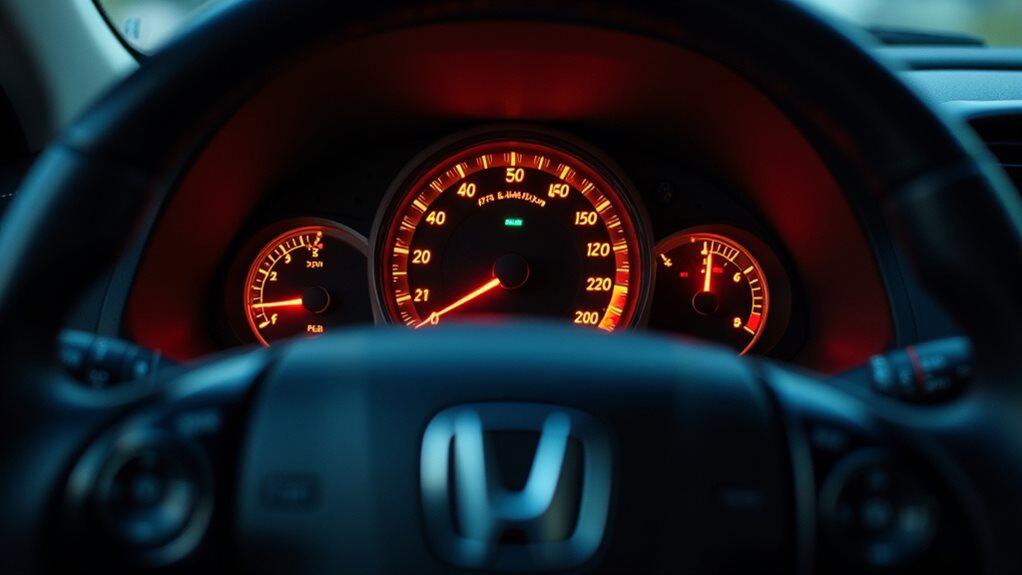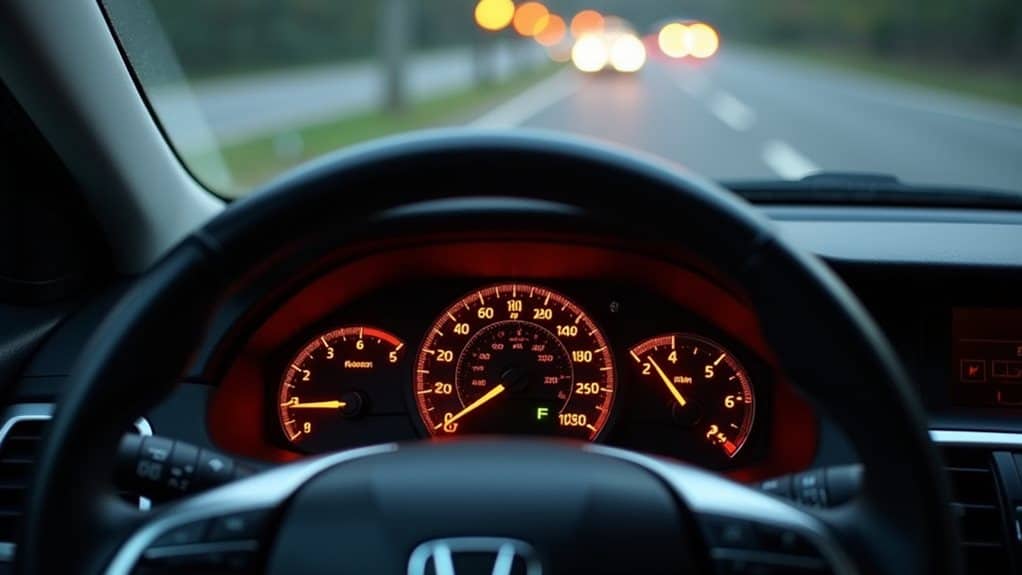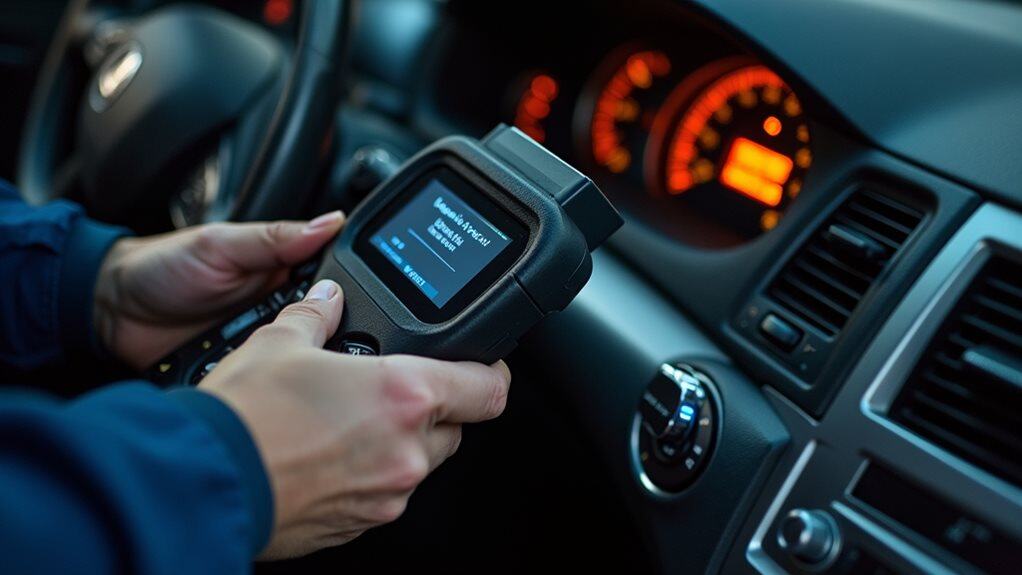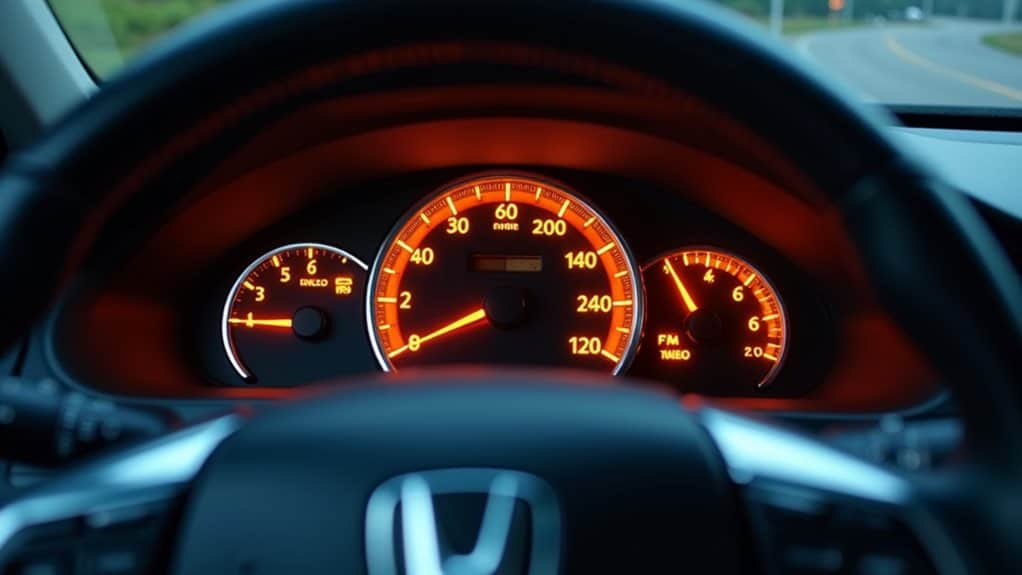Your Honda Accord’s flashing check engine light and shaking indicate a severe engine misfire that demands immediate attention to prevent catastrophic catalytic converter damage. The misfire occurs when cylinders fail to combust properly, sending unburned fuel into the exhaust system where it can overheat and destroy the converter’s ceramic structure. Common causes include faulty spark plugs, ignition coils, clogged fuel injectors, or vacuum leaks disrupting the air-fuel mixture. Understanding these diagnostic procedures and repair solutions can save you thousands in potential repairs.
Quick Tips
- A flashing check engine light with car shaking indicates severe engine misfire requiring immediate diagnostic attention.
- Common causes include faulty spark plugs, ignition coils, clogged fuel injectors, or worn piston rings affecting combustion.
- Continuing to drive risks expensive catalytic converter damage from unburned fuel flooding the exhaust system.
- Use OBD-II scanner to read trouble codes P0300-P0308 which identify specific misfiring cylinders needing repair.
- Contact Honda-certified technicians immediately as flashing check engine light signals unsafe driving conditions requiring professional diagnosis.
Engine Misfire: The Primary Culprit Behind Your Honda Accord’s Warning Signs

When your Honda Accord’s check engine light illuminates while the vehicle shakes or vibrates, you’re most likely experiencing an engine misfire—a condition where one or more cylinders fail to fire properly during the combustion process. This malfunction creates sudden power loss, distinctive popping sounds from the exhaust, and noticeable hesitation during acceleration, requiring immediate diagnostic attention. Broken engine mounts can also contribute to these symptoms by affecting vacuum lines and causing additional vibrations that worsen the misfire condition. Additionally, a defective ignition switch can inhibit the power supply to the starter motor, exacerbating the starting issues associated with an engine misfire.
Understanding the Connection Between Catalytic Converter Risk and Misfires
When your Honda Accord misfires, the unburned fuel that escapes combustion doesn’t simply disappear—it travels downstream and floods your catalytic converter, creating a cascade of expensive problems. A clogged catalytic converter can disrupt the exhaust flow, exacerbating the misfire and leading to further engine performance issues. This excess gasoline contaminates the converter’s internal substrates, causes dangerous overheating, and can permanently damage the emission control system that keeps your car legal and environmentally compliant. Modern engines operating at 210°F create optimal conditions for ethanol combustion, but this higher temperature also intensifies catalytic converter stress when misfires occur. You can protect your catalytic converter from this costly damage by addressing misfires immediately and understanding how proper routine maintenance prevents the chain reaction that turns a simple ignition problem into a major repair bill.
Unburned Fuel Damage
The relationship between engine misfires and catalytic converter damage creates a destructive cycle that can lead to expensive repairs if left unchecked.
When your engine misfires, unburned fuel enters the exhaust system and ignites inside the catalytic converter, causing extreme overheating.
This overheating melts the converter’s ceramic honeycomb structure while fuel deposits clog its porous surfaces.
Converter Protection Methods
Although catalytic converter theft has reached epidemic proportions nationwide, you can implement several proven protection strategies that simultaneously safeguard your Honda Accord’s exhaust system and prevent the costly damage that engine misfires inflict on this critical emissions component.
Install metal shields underneath your vehicle, engrave your VIN number onto the converter, and configure your car alarm to detect vibrations from cutting tools.
Common Causes of Engine Misfires in Honda Accord Models

Since Honda Accord engines rely on precise timing and proper fuel delivery to operate smoothly, several mechanical and electronic issues can disrupt this delicate balance and cause misfires.
You’ll encounter problems from clogged fuel injectors restricting cylinder fuel flow, worn piston rings reducing compression, faulty oxygen sensors creating incorrect air-fuel mixtures, and vacuum leaks allowing excess air intake. A failing alternator can also lead to insufficient power to the spark plugs, contributing to engine misfire issues.
Spark Plug Failures and Ignition System Problems
When spark plugs fail in your Honda Accord, they create a cascade of performance problems that directly cause the engine shaking and check engine light you’re experiencing.
Failed spark plugs can’t ignite the air-fuel mixture properly, causing misfires that make your engine shake violently during idling and acceleration while triggering the flashing check engine light. Additionally, common signs of starter problems may also occur if there are underlying electrical issues affecting the ignition system.
Fuel Injection Issues and Sensor Malfunctions

When your Honda Accord’s fuel injectors become clogged or malfunction, they can’t deliver the precise amount of fuel your engine needs, which causes misfires that make your car shake and triggers the flashing check engine light.
You’ll need to recognize specific signs like rough idling, poor acceleration, and increased fuel consumption to identify clogged injector problems before they damage your catalytic converter.
Additionally, faulty sensors like the throttle position sensor, mass airflow sensor, or oxygen sensors send incorrect data to your engine’s computer, creating the same shaking and check engine light symptoms that require professional diagnostic equipment to pinpoint and resolve.
Clogged Fuel Injector Signs
A faulty fuel injector acts like a clogged garden hose, restricting the precise flow of fuel your Honda Accord’s engine needs to run smoothly.
You’ll notice delayed acceleration, rough idling with vibrations, and unexpected stalling. The check engine light typically illuminates, while misfires create inconsistent performance.
These symptoms stem from dirt, carbon deposits, or contamination blocking the injector nozzles.
Faulty Sensor Diagnostics
Your Honda Accord’s electronic control unit (ECU) functions as the brain of your vehicle’s fuel injection system, continuously monitoring data from multiple sensors to maintain ideal engine performance.
When sensors like the throttle position sensor or mass airflow sensor malfunction, they send incorrect data to the ECU, causing improper fuel delivery and engine misfires that trigger your flashing check engine light.
Recognizing Additional Symptoms Beyond the Flashing Light
Although the flashing check engine light serves as your primary warning signal, several additional symptoms typically accompany this issue and can help you identify the underlying problem more accurately.
You’ll notice sputtering during acceleration, rough vibration while idling, and your engine pulling harder than normal.
These symptoms often worsen with temperature changes or abrupt weather conditions.
Immediate Dangers of Ignoring a Flashing Check Engine Light

When your Honda Accord’s check engine light starts flashing while the car shakes, you’re witnessing warning signs of serious engine problems that demand immediate attention.
Ignoring these symptoms can cause catastrophic engine damage, requiring costly replacement. Misfires damage your catalytic converter, creating thousands in repair bills.
You’ll face reduced fuel efficiency, safety risks, and potential breakdowns.
How Your Honda’s Engine Computer Responds to Misfires
Behind the scenes of these alarming symptoms, your Honda’s sophisticated engine computer works overtime to detect and respond to misfires with extraordinary precision.
It continuously monitors crankshaft sensor data, detecting speed fluctuations that indicate combustion failures. The PCM immediately stores diagnostic trouble codes like P0300-P0308, identifies affected cylinders, and adjusts fuel delivery or spark timing to compensate for misfires.
Professional Diagnostic Process and Code Reading

Three essential steps form the foundation of professional diagnostic procedures when your Honda Accord displays a check engine light and shaking symptoms.
First, technicians perform visual inspection of spark plugs, ignition coils, and wiring.
Next, they connect scan tools to read trouble codes from your engine’s computer.
Finally, they analyze live data streams to pinpoint exact failure causes.
Step-by-Step Repair Procedures for Misfire Issues
Once you’ve identified misfire codes through professional diagnostics, the repair process begins with systematic component inspection and replacement.
Start by removing ignition coil connectors carefully, squeezing clips to avoid damage. Inspect coils for cracking, corrosion, or oil contamination that causes cylinder-specific misfires.
Swap coils between cylinders to determine if misfire codes follow the faulty component.
Preventive Maintenance to Avoid Future Engine Problems

Following a consistent tune-up schedule forms the foundation of preventing engine misfires and check engine light problems in your Honda Accord.
You’ll want to replace spark plugs every 30,000 miles, change your air filter regularly, and maintain proper fluid levels to keep your engine running smoothly.
Additionally, using quality fuel from reputable stations helps prevent carbon buildup and fuel system contamination that can trigger the performance issues you’re trying to avoid.
Regular Tune-Up Schedule
When your Honda Accord develops a check engine light accompanied by shaking, establishing a proactive maintenance schedule becomes your most effective defense against recurring engine problems.
You’ll need oil changes every 5,000 miles, spark plug replacements at 30,000 miles, and coolant service at 45,000 miles.
Schedule timing belt replacement at 105,000 miles to prevent catastrophic engine failure.
Quality Fuel Practices
Why does fuel quality matter so much for your Honda Accord’s engine health?
Poor fuel causes incomplete combustion, leading to misfires and shaking.
Use premium fuel with proper octane rating, replace filters every 30,000-60,000 miles, and avoid running your tank too low.
Quality fuel additives clean injectors and prevent carbon deposits that trigger check engine lights.
When to Seek Professional Help for Your Honda Accord
How do you know if your Honda Accord’s check engine light and shaking require immediate professional attention?
A flashing check engine light signals severe engine misfire, making your vehicle unsafe to drive. This combination risks costly catalytic converter damage from unburned fuel entering the exhaust system.
Stop driving immediately and contact Honda-certified technicians for proper diagnostic equipment and knowledge.
Wrapping Up
When your Honda Accord’s check engine light flashes and the car shakes, you’re likely dealing with an engine misfire that requires immediate attention. Don’t ignore these warning signs, as continued driving can damage your catalytic converter and lead to expensive repairs. Start by checking spark plugs and ignition components, but remember that fuel system issues and sensor problems can also cause misfires. If you’re uncomfortable performing diagnostics yourself, contact a qualified mechanic promptly.

